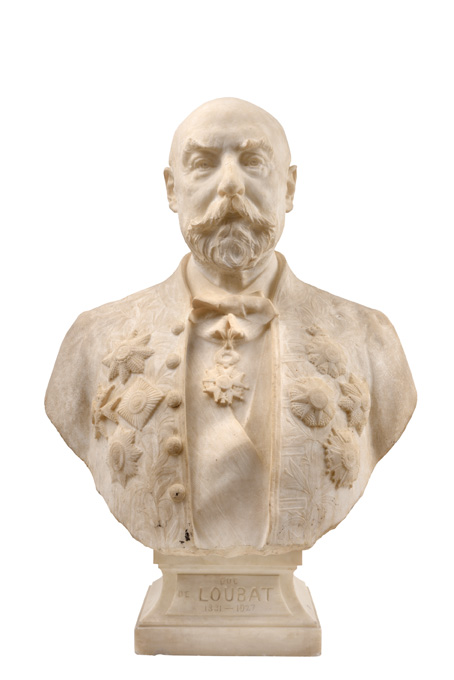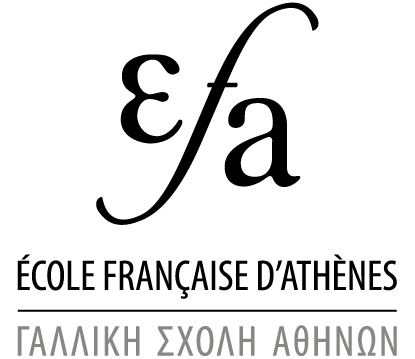 The French School at Athens (FSA) was founded in 1846 by order of King Louis-Philippe. From the outset, it was dependent for funding on the Ministry of Public Instruction, which later became the Ministry of National Education. It had no other source of support. The first sponsor in the School’s history was the Duke of Loubat. This is what the historian of the excavations undertaken on the island of Delos, Jean-Charles Moretti, writing in his collection, Patrimoines photographiques, said of Loubat’s approach: “1903 was the first year in which, following a suggestion by Georges Perrot, Perpetual Secretary of Inscriptions and Belles-Lettres, the wealthy American, Joseph Florimond Loubat, to whom Pope Leon XIII had granted the title of Pontifical Duke, made a donation of 50,000 Francs to the FSA so that it could continue with the Delos excavations. Although he had no particular interest in the island, which he never visited, he made the same annual donation until the outbreak of the First World War, requesting accurate accounts of all expenses and the volume of materials excavated. In 1903, Henri Convert counted “60,990 carts of excavation materials, or 31,000 cubic metres of earth transported to the sea”. When, on August 8, 1910, the King of Greece, George I, visited Delos, knowing what the exploration of the island owed to the Duke of Loubat, he sent him the following telegram: “After visit to Delos, address my felicitations”. Loubat’s donation did little to change the day-to-day lives of the archaeologists. But it did make it possible to increase the scope of the excavations dramatically. The team could now dig for between four and six months a year, in a number of different areas simultaneously, employing up to 200 workmen, almost all of whom came from Mykonos. It should also be mentioned that, after the First World War, the Duke of Loubat continued to make donations in support of the Delos School’s projects until his death in 1927.
The French School at Athens (FSA) was founded in 1846 by order of King Louis-Philippe. From the outset, it was dependent for funding on the Ministry of Public Instruction, which later became the Ministry of National Education. It had no other source of support. The first sponsor in the School’s history was the Duke of Loubat. This is what the historian of the excavations undertaken on the island of Delos, Jean-Charles Moretti, writing in his collection, Patrimoines photographiques, said of Loubat’s approach: “1903 was the first year in which, following a suggestion by Georges Perrot, Perpetual Secretary of Inscriptions and Belles-Lettres, the wealthy American, Joseph Florimond Loubat, to whom Pope Leon XIII had granted the title of Pontifical Duke, made a donation of 50,000 Francs to the FSA so that it could continue with the Delos excavations. Although he had no particular interest in the island, which he never visited, he made the same annual donation until the outbreak of the First World War, requesting accurate accounts of all expenses and the volume of materials excavated. In 1903, Henri Convert counted “60,990 carts of excavation materials, or 31,000 cubic metres of earth transported to the sea”. When, on August 8, 1910, the King of Greece, George I, visited Delos, knowing what the exploration of the island owed to the Duke of Loubat, he sent him the following telegram: “After visit to Delos, address my felicitations”. Loubat’s donation did little to change the day-to-day lives of the archaeologists. But it did make it possible to increase the scope of the excavations dramatically. The team could now dig for between four and six months a year, in a number of different areas simultaneously, employing up to 200 workmen, almost all of whom came from Mykonos. It should also be mentioned that, after the First World War, the Duke of Loubat continued to make donations in support of the Delos School’s projects until his death in 1927.
The annals of the School make reference to the Dutch family, Goekoop de Jong, which funded the archaeological excavations of the Minoan Palace of Malia in Crete. But it was not until the 1960s that a large private investment was made, when the Péchiney Group built an aluminium extraction plant at the Medeon site not far from Delphi, and funded the excavations there. In Delphi itself, Électricité de France (EDF) contributed to the task of digitizing the blocks of the Tholos, the basis of a 3D reconstruction of the building. In 2014, a large donation from the Stavros Niarchos Foundation made it possible to present the exhibition Philippi 1914-2014. 100 years of research carried out by the French School at Athens, and elaborate the accompanying catalogue. Meanwhile, in the last few years, the Kaplan Foundation has helped with the restoration of a number of buildings located on the Delos coast.
As we can see, up until now, the French School at Athens has had relatively few sponsors. Indeed, sponsors account for a very small percentage of the overall funding of the works and publications of this prestigious research centre. In 2014, with a view to addressing this shortcoming and confronting new challenges in the field of research and heritage conservation, the School took two initiatives. The first was to open an Endowment Fund to collect gifts, legacies and donations from firms, foundations and individual donors in France. The second was to set up the Association of the Friends of the French School at Athens (AEFA), the head office of which is located in the Greek capital. The aim of the Association is to increase the School’s capacity to put the energy and generosity of its sponsors to good use.


